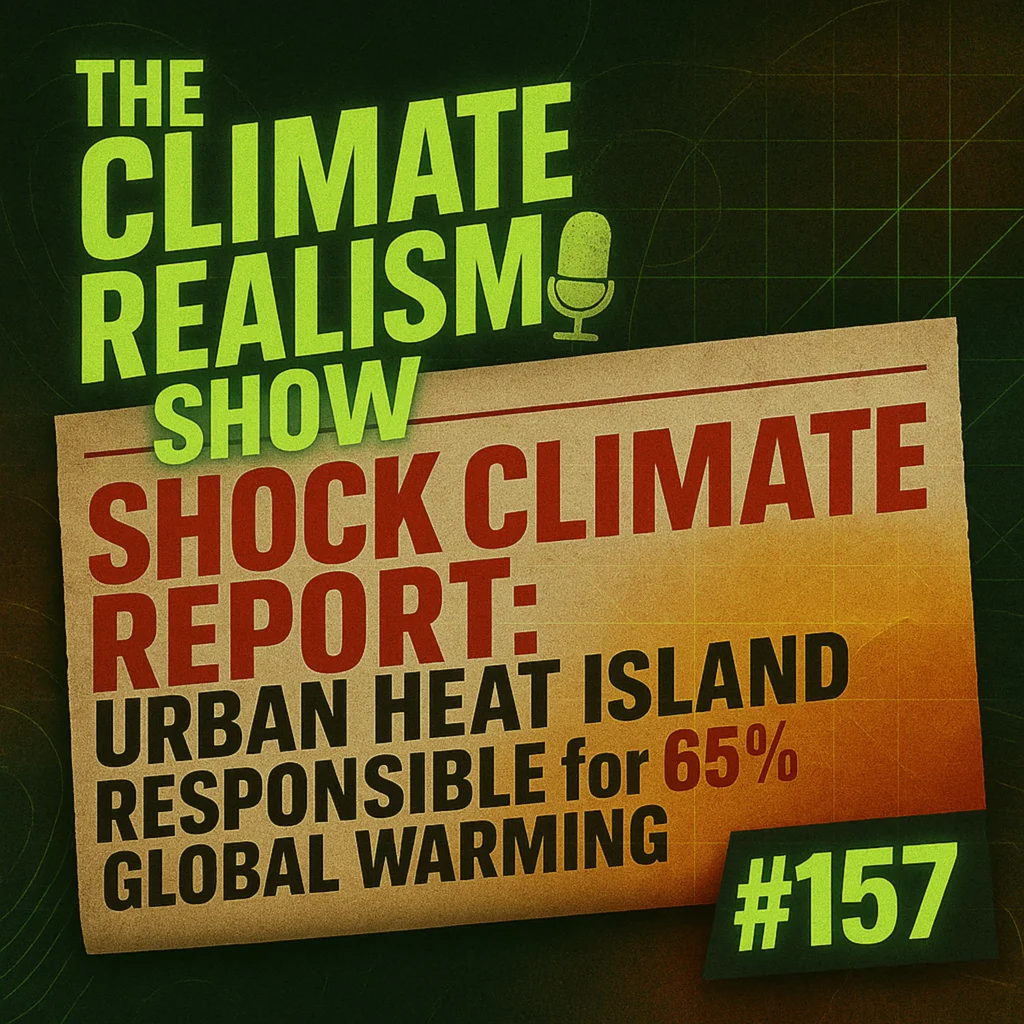
Roy Spencer
He is now a Principal Research Scientist at the University of Alabama in Huntsville and a Policy Advisor to The Heartland Institute.
Dr. Spencer’s work with NASA continues as the U.S. Science Team leader for the Advanced Microwave Scanning Radiometer flying on NASA’s Aqua satellite. His diligent work on tracking the planet’s temperature provided a tamper-proof source of data with which to test predictions of man-made global warming. He has provided congressional testimony several times on the subject of global warming.
Dr. Spencer is the author or coauthor of scores of articles appearing in the peer-reviewed journals, including the following:
Spencer, R.W. and W.D. Braswell, 2014: The role of ENSO in global ocean temperature changes during 1955-2011 simulated with a 1D climate model. Asia-Pac. J. Atmos. Sci. 50 (2): 229-237.
Spencer, R.W. and W.D. Braswell, 2011: On the misdiagnosis of surface temperature feedbacks from variations in Earth’s radiant energy balance. Remote Sens. 3: 1603-1613; doi:10.3390/rs3081603.
Spencer, R.W. and W.D. Braswell, 2010: On the diagnosis of radiative feedback in the presence of unknown radiative forcing. J. Geophys. Res. 115: doi:10.1029/2009JD013371.
Spencer, R.W. and W.D. Braswell, 2008: Potential biases in cloud feedback diagnosis: A simple model demonstration. J. Climate 23: 5624-5628.
Spencer, R.W., 2008: An Inconvenient Truth: blurring the lines between science and science fiction. GeoJournal: doi: 10.1007/s10708-008-9129-9.
Spencer, R.W., W.D. Braswell, J.R. Christy, and J. Hnilo, 2007: Cloud and radiation budget changes associated with tropical intraseasonal oscillations. J. Geophys. Res. 9 (August).
Christy, J.R., W.B. Norris, R.W. Spencer, and J.J. Hnilo, 2007: Tropospheric temperature change since 1979 from tropical radiosonde and satellite measurements. J. Geophys. Res. 112, D06102, 16 pp.
Ohring, G., B. Wielicki, R. Spencer, B. Emery, and R. Datla, 2005: Satellite instrument calibration for measuring global climate change. Bull. Amer. Meteor. Soc.: 1303-1313.
Lobl, E.E. and R.W. Spencer, 2004: The Advanced Microwave Scanning Radiometer for the Earth Observing System (AMSR-E) and its products. Italian Journal of Remote Sensing 30/31: 9-18.
Kawanishi, T., T. Sezai, Y. Ito, K. Imaoka, T. Takeshima, Y. Ishido, A. Shibata, M. Miura, H. Inahata, and R.W. Spencer, 2003: The Advanced Microwave Scanning Radiometer for the Earth Observing System (AMSR-E), NASDA’s contribution to the EOS for Global Energy and Water Cycle Studies. IEEE Trans. Geosys. Rem. Sens. 41: 184-194.
Christy, J.R., R.W. Spencer, W.B. Norris, W.D. Braswell, and D.E. Parker, 2003: Error Estimates of Version 5.0 of MSU-AMSU Bulk Atmospheric Temperatures. Journal of Atmospheric and Oceanic Technology 20: 613-629.
Robertson, F.R., R.W. Spencer, and D.E. Fitzjarrald, 2001: A new satellite deep convective ice index for tropical climate monitoring: Possible implications for existing oceanic precipitation datasets. Geophys. Res. Lett. 28 (2): 251-254.
Imaoka, K. and R.W. Spencer, 2000: Diurnal variation of precipitation over the tropical oceans observed by TRMM/TMI combined with SSM/I. J. Climate 13: 4149-4158.
Christy, J.R., R.W. Spencer, and W. D. Braswell, 2000: MSU tropospheric temperatures: Dataset construction and radiosonde comparisons. J. Atmos. Ocean. Tech. 17: 1153-1170.
Spencer, R.W., F.J. LaFontaine, T. DeFelice, and F.J. Wentz, 1998: Tropical oceanic precipitation changes after the 1991 Pinatubo Eruption. J. Atmos. Sci. 55: 1707-1713.
Wentz, F.J. and R.W. Spencer, 1998: SSM/I rain retrievals within a unified all-weather ocean algorithm. J. Atmos. Sci. 55: 1613-1627.
Christy, J.R., R.W. Spencer, and E.S. Lobl, 1998: Analysis of the merging procedure for the MSU daily temperature time series. J. Climate 11: 2016-2041.
Spencer, R.W. and W.D. Braswell, 1997: How dry is the tropical free troposphere? Implications for global warming theory. Bull. Amer. Meteor. Soc. 78: 1097-1106.
Spencer, R.W., J.R. Christy, and N.C. Grody, 1996: Analysis of “Examination of Global atmospheric temperature monitoring with satellite microwave measurements.” Climatic Change 33: 477-489.
Spencer, R.W., 1994: Oceanic rainfall monitoring with the microwave sounding units. Rem. Sens. Rev. 11: 153-162.
Spencer, R.W., 1994: Global temperature monitoring from space. Adv. Space Res. 14 (1): 69-75.
Spencer, R.W., 1993: Monitoring of global tropospheric and stratospheric temperature trends. In Atlas of Satellite Observations Related to Global Change. New York, NY: Cambridge University Press.
Spencer, R.W., 1993: Global oceanic precipitation from the MSU during 1979-92 and comparisons to other climatologies. J. Climate 6: 1301-1326.
Spencer, R.W. and J.R. Christy, 1993: Precision lower stratospheric temperature monitoring with the MSU: Technique, validation, and results 1979-91. J. Climate 6: 1301-1326.
Spencer, R.W. and J.R. Christy, 1992a: Precision and radiosonde validation of satellite gridpoint temperature anomalies, Part I: MSU channel 2. J. Climate 5: 847-857.
Spencer, R.W. and J.R. Christy, 1992b: Precision and radiosonde validation of satellite gridpoint temperature anomalies, Part II: A tropospheric retrieval and trends during 1979-90. J. Climate 5: 858-866.
Spencer, R.W., J.R. Christy, and N.C. Grody, 1990: Global atmospheric temperature monitoring with satellite microwave measurements: Method and results, 1979-84. J. Climate 3: 1111-1128.
Spencer, R.W. and J.R. Christy, 1990: Precise monitoring of global temperature trends from satellites. Science 247: 1558-1562.
Dr. Spencer is the author of two popular books on the global warming debate, Climate Confusion: How Global Warming Hysteria Leads to Bad Science, Pandering Politicians and Misguided Policies That Hurt the Poor (2008) and The Great Global Warming Blunder: How Mother Nature Fooled the World’s Top Climate Scientists (2010), both published by Encounter Books.
Dr. Spencer has made no secret of his evangelical faith, making him a model and inspiration for other scientists and evangelicals alike. He has been a senior advisor to The Cornwall Alliance for the Stewardship of Creation since its founding in 2005.
Dr. Spencer received his Ph.D. in meteorology at the University of Wisconsin-Madison in 1981.
Dr. Spencer’s research has been entirely supported by U.S. government agencies: NASA, NOAA, and DOE. He has never been asked by any oil company to perform any kind of service. Not even Exxon-Mobil.
Roy Spencer Contributions

- Climate Change
- Environment & Energy

- Environment & Energy


